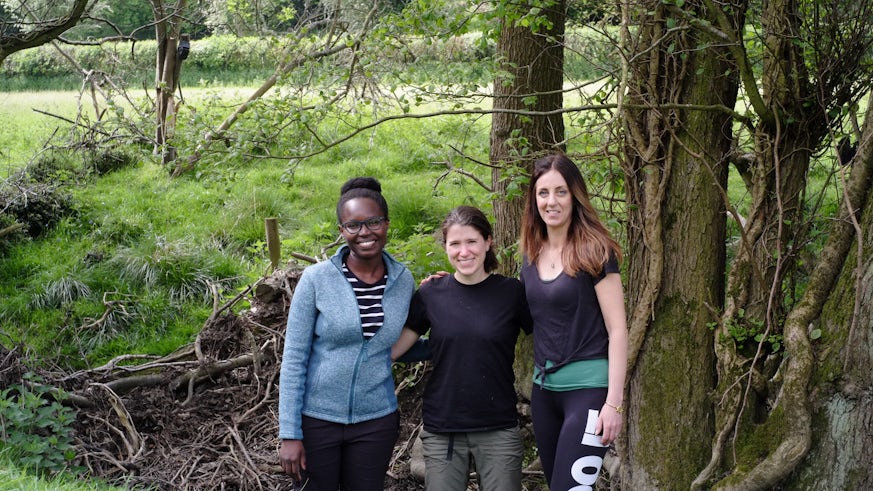National award for nature-based approach to flooding project
1 July 2022

Dr Catherine Wilson and her colleagues, Dr Elizabeth Follett and Dr Valentine Muhawenimana of the School of Engineering, along with Shropshire Council, WSP and the Shropshire Wildlife Trust have won the 'Studies and Research’ category for the prestigious ICE West Midlands Awards 2022.
The team celebrated their success at the ICE West Midlands Awards held last week. The ICE West Midlands Awards provide an opportunity to celebrate all aspects of civil engineering and are presented to the best civil engineering projects, people and ground-breaking research across Birmingham, the Black Country, Coventry, Herefordshire, Shropshire, Solihull, Staffordshire, Warwickshire, and Worcestershire.
The award was presented to the partnership for their impactful study: The Shropshire Slow the Flow (SStF) Natural Flood Management (NFM) Project. This project which was carried out in the Corvedale catchment in Shropshire utilised nature based approaches to flooding including instream wood structures known as leaky barriers, to help reduce flood risk, improve biodiversity, whilst also supporting partnership and community working.
The research conducted by Cardiff University determined the effectiveness of leaky barriers in raising water level behind the barriers and increasing water storage. The research involved using innovative technology, skills and techniques to quantify the flood attenuation effects of these nature based solution to flooding.
Starting in 2018, the project focused on monitoring the flood attenuation effects of leaky barriers using an acoustic doppler flow sensor, tipping bucket rain gauges, and pressure level sensors throughout the catchment, logging and transmitting data every 15 minutes. The monitoring equipment was used to gather quantitative evidence on leaky wood barrier performance in response to different storm magnitudes and characteristics including determining the backwater rise magnitude and net increase in water storage generated by the leaky barriers.
ICE West Midlands said, ‘Globally this research offers many potential long-term benefits for society’.
Dr Catherine Wilson, Deputy Director of the Hydro-environmental Research Centre at Cardiff University said, “The practical knowledge of leaky barrier construction and design learned from Shropshire Wildlife Trust in this project, together with the quantitative evidence of the flood attenuation effects of the Corvedale leaky barriers, will inform the design of future nature-based approaches to flooding throughout the UK.”
“This project is an excellent example of industrial-NGO-academic collaboration and indeed, the use of leaky barriers to add water storage and slow the passage of a flood in a river catchment. Working together and with nature, we managed to do so much more.”
Councillor Ian Nellins, Cabinet Member for Climate Change, Natural Assets and The Green Economy added:
“We are thrilled that The Shropshire Slow the Flow Natural Flood Management Project has won its category at the ICE West Midlands Award.
“This is partnership working at its best. Utilising the skills, knowledge and techniques of all organisations involved, our project clearly demonstrates that our research is highly recognised within the industry and is going to be used for years to come in terms of natural flood and flood risk management.
“Winning such an award further strengthens our resolve to increase our resilience to the climate emergency through engineering projects that are balanced with environmental benefits and working with the community.”
“I would like to say a huge congratulations to our Highways team, WSP, Shropshire Wildlife Trust and Cardiff University for this ground-breaking project.”
Luke Neal, Land & Water Team Deputy Manager, Shropshire Wildlife Trust added:
“Shropshire Wildlife Trust are delighted that our work, delivered in partnership, has been able to be used to produce such high-quality research. This type of data strengthens the ability of organisations like ours to implement effective Natural Flood Management in the right place at the right scale to protect communities and improve the resilience of our landscapes.”
ICE West Midlands Award categories 2022 included the best large, medium, and small project, as well as accolades for communication, innovation, heritage, team achievement and a range of people awards.
All types and sizes of project are considered - from local schemes to multi-million-pound, cross-county infrastructure work.
The winners were announced at the ICE West Midlands Awards Ceremony, which took place on Thursday, 5 May 2022, at the MacDonald Burlington Hotel in Birmingham. Highly Commended in the Studies and Research category was the Quantum Technology, Mapping and Map Integration for Buried Assets (QT-MIBA), delivered by the University of Birmingham, working with Northumbrian Water and RSK Environment
Commenting, ICE East and West Midlands Regional Director, Jo Barnett, said:
"Congratulations to our winner and highly commended projects in this year’s Studies and Research award. Both projects have the potential to make a real difference to society and those working in civil engineering.
"Our annual awards play an important role in not only demonstrating the importance of our civil engineers, whose hard work and dedication can often go unnoticed, but also in celebrating the positive impact that civil engineering has on everyday lives.”
For further information about this project please contact John Bellis, Design and Flood Risk Manager at john.bellis@shropshire.gov.uk or Dr Catherine Wilson at wilsonca@cardiff.ac.uk
The project was funded by the Department for Environment, Food and Rural Affairs.